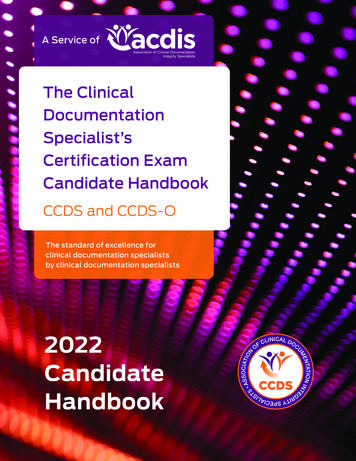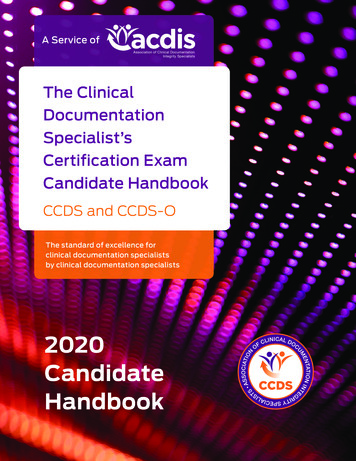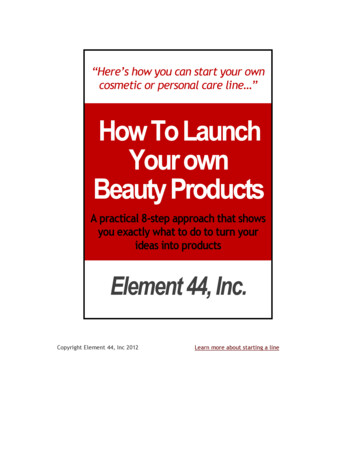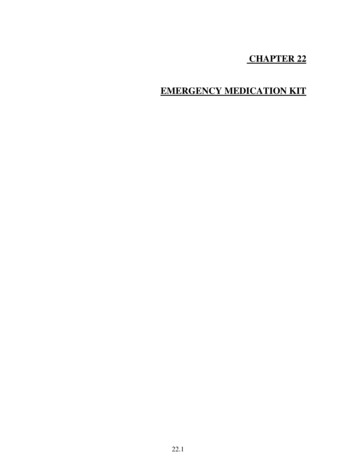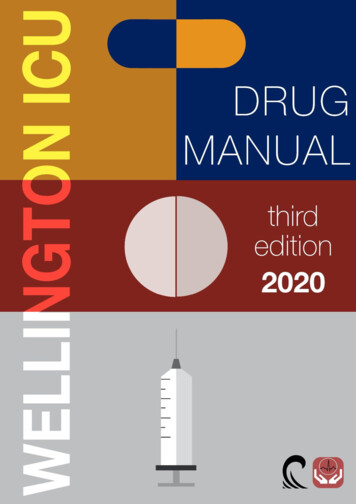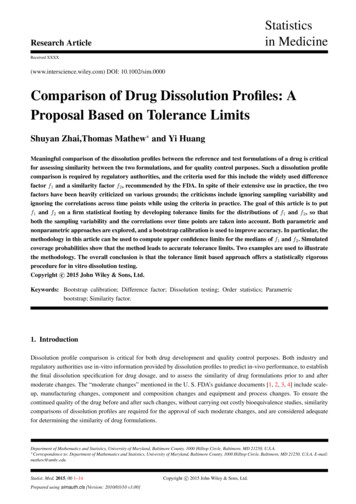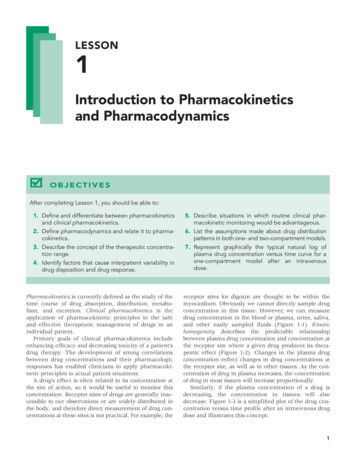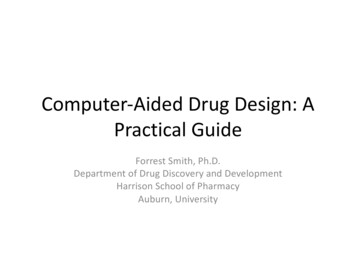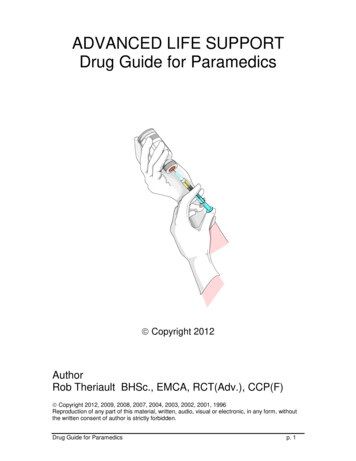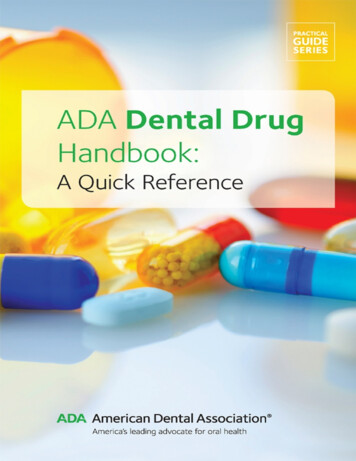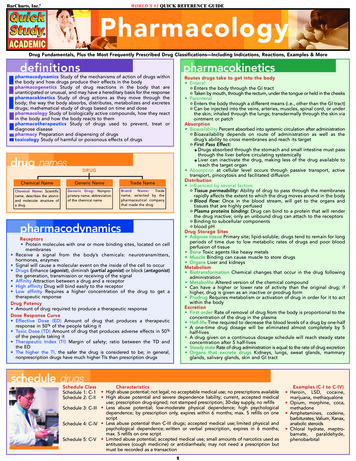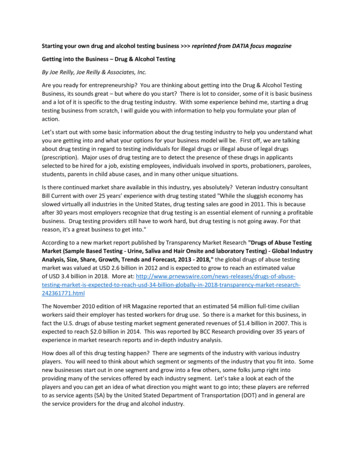
Transcription
Starting your own drug and alcohol testing business reprinted from DATIA focus magazineGetting into the Business – Drug & Alcohol TestingBy Joe Reilly, Joe Reilly & Associates, Inc.Are you ready for entrepreneurship? You are thinking about getting into the Drug & Alcohol TestingBusiness, its sounds great – but where do you start? There is lot to consider, some of it is basic businessand a lot of it is specific to the drug testing industry. With some experience behind me, starting a drugtesting business from scratch, I will guide you with information to help you formulate your plan ofaction.Let’s start out with some basic information about the drug testing industry to help you understand whatyou are getting into and what your options for your business model will be. First off, we are talkingabout drug testing in regard to testing individuals for illegal drugs or illegal abuse of legal drugs(prescription). Major uses of drug testing are to detect the presence of these drugs in applicantsselected to be hired for a job, existing employees, individuals involved in sports, probationers, parolees,students, parents in child abuse cases, and in many other unique situations.Is there continued market share available in this industry, yes absolutely? Veteran industry consultantBill Current with over 25 years’ experience with drug testing stated "While the sluggish economy hasslowed virtually all industries in the United States, drug testing sales are good in 2011. This is becauseafter 30 years most employers recognize that drug testing is an essential element of running a profitablebusiness. Drug testing providers still have to work hard, but drug testing is not going away. For thatreason, it's a great business to get into."According to a new market report published by Transparency Market Research "Drugs of Abuse TestingMarket (Sample Based Testing - Urine, Saliva and Hair Onsite and laboratory Testing) - Global IndustryAnalysis, Size, Share, Growth, Trends and Forecast, 2013 - 2018," the global drugs of abuse testingmarket was valued at USD 2.6 billion in 2012 and is expected to grow to reach an estimated valueof USD 3.4 billion in 2018. More at: 242361771.htmlThe November 2010 edition of HR Magazine reported that an estimated 54 million full-time civilianworkers said their employer has tested workers for drug use. So there is a market for this business, infact the U.S. drugs of abuse testing market segment generated revenues of 1.4 billion in 2007. This isexpected to reach 2.0 billion in 2014. This was reported by BCC Research providing over 35 years ofexperience in market research reports and in-depth industry analysis.How does all of this drug testing happen? There are segments of the industry with various industryplayers. You will need to think about which segment or segments of the industry that you fit into. Somenew businesses start out in one segment and grow into a few others, some folks jump right intoproviding many of the services offered by each industry segment. Let’s take a look at each of theplayers and you can get an idea of what direction you might want to go into; these players are referredto as service agents (SA) by the United Stated Department of Transportation (DOT) and in general arethe service providers for the drug and alcohol industry.
Specimen Collectors (the collector) – These folks operate on a mobile basis traveling to and from clientlocations and/or work from a brick and mortar facility. The specimen collector works directly for theclient, the laboratory, the third party administrator (TPA) or others. The collector is collecting abiological specimen (urine, hair, blood, sweat or oral fluid-saliva) for a testing device or a laboratory todetermine the presence or absence of specified parent drugs or their metabolites.Collection Site: A facility where specimens are collected. This could be the employer place of business.Typically this is a brick and mortar facility, it could be a TPA office, a medical facility, hospital,occupational health clinic, walk in clinic, doctor’s offices – any type of business that might have a set upand employ collectors to collect specimens. Major laboratories such as Quest Diagnostics and LabCorpoperate brick and mortar facilities that employ collectors to collect specimens; these are commonlyreferred to as Patient Service Centers (PSC’s). Other laboratories have contracts with occupationalhealth clinics, walk in clinics, doctor’s offices and other facilities that operate brick and mortar facilitiesto collect specimens.Breath Alcohol Technician (BAT) and/or Screening Test Technician (STT) – commonly a collector also,the BAT or STT is a person who instructs and assists persons in the alcohol testing process and operatesan evidential breath testing device (Breathalyzer) or alcohol screening device. These folks also operateon a mobile basis traveling to and from client locations and/or work at collection site; they also workdirectly for the client, the laboratory, the third party administrator (TPA) or others.Laboratories (Lab) - After collection from the donor, a specimen is sealed with a tamper-evident sealand sent to a laboratory for analysis. The primary advantages of utilizing a laboratory for testing includecompliance with regulations, accuracy, legal defensibility, and the ability to customize tests for aparticular demographic group. A laboratory is a brick and mortar facility that does the testing, not thefacility that collects the specimen. Folks get confused about this and say I’m going to the lab for my drugtest, they actually mean they are going to the collection site for specimen collection. A very biginvestment is required to own and operate a laboratory. Laboratories currently involved with drugtesting include Quest Diagnostics, LabCorp, MEDTOX, and Clinical Reference Laboratory (CRL) – thereare many others also both regional and national players.Instant Testing Manufacturers and Distributors - On-site instant or rapid drug testing is becoming morewidely used as a more cost-efficient method of effectively detecting drug abuse amongst employees, aswell as in rehabilitation programs to monitor patient progress. These instant tests are available for bothurine and saliva testing. These instant test kits are visually read and subject to interpretation by thecollector. They provide an indication of drug use within minutes but they are only equivalent to theimmunoassay stage of laboratory testing; confirmatory laboratory testing is required for test results thatare not negative. There are many industry players in the business of selling these test kits as adistributor of products. Also, many service providers use these kits in conjunction with other testingmethods and services they make available to their clients. Note that under some state laws as well asDOT rules and under HHS rules for Federal workplace drug testing, these instant testing devices cannotbe used.Medical Review Officer (MRO) - A Medical Review Officer (MRO) is a person who is a licensed physicianand who is responsible for receiving and reviewing laboratory results generated by an employer's drugtesting program and evaluating medical explanations for certain drug test results. The MRO receives the
laboratory drug test results from the lab and reports the results to the employer. Many TPA’s have inhouse MRO’s working for them.Walk in Clinics, Hospitals, Doctors Offices, and Occupational Health Clinics – All of these types offacilities might be in the drug and alcohol testing business perhaps as collector sites, third partyadministrators (TPA) and/or Medical Review Officers (MRO). All are potential competitors and/orpotential clients and most definitely potential strategic partners.Employee Assistance Program (EAP) Provider – EAP’s are employee benefit programs offered by manyemployers, many times in conjunction with a health insurance plan. EAPs help employees deal withpersonal problems that might adversely impact their work performance, health, and well-being. EAPsgenerally include assessment, short-term counseling and referral services for employees and theirhousehold members. Employers will refer employees with drug and/or alcohol problems to the EAP.Substance Abuse Professional (SAP) – Under DOT regulations, the SAP is a person who evaluatesemployees who have violated a DOT drug and alcohol program regulation and makes recommendationsconcerning education, treatment, follow-up testing, and aftercare. There are credentials andcertifications required for one to be a SAP.Third Party Administrator (TPA) – This is basically a service provider that provides two or more of theservices involved in the drug testing process. A TPA might coordinate for an employer the entire processof the specimen collection, breath alcohol testing, the laboratory testing, the review and reporting bythe Medical Review Officer (MRO) thereby providing all of these services under a one stop shop. A TPAwill typically provide everything to the employer client to keep the client in compliance with theapplicable regulations – DOT, State Laws etc.So now you have an idea of the various players involved in the industry, you can think about where youmight fit in. Some folks might start out as a collector and a BAT providing specimen collections andalcohol testing to various employers and on behalf of TPA’s and or Labs. This can be a home basedbusiness or can be a brick and mortar facility – a collection site.But first now that you have a general idea of what this business looks like, you will need to considersome basics in starting a new business. Most importantly, do you really want to operate independentlyand be the person making all the decisions and shouldering all the responsibility?This is a question that needs serious thought and will determine if you have the entrepreneurialqualities needed to go out on your own. Also, you must think about, discuss and plan for the following:Write a Business Plan: A good business plan should include a description of what you are selling, whothe prospective customers are, how you plan to promote, how much money is needed for start-up costsand what are your projections for revenue and expenses.Legal Format of your Business: The basic legal forms of business ownership are sole proprietorship,partnership, limited liability corporation (LLC) and corporation (Sub Chapter S or C Corporation). Talk toan attorney and your accountant about what makes sense for you and the business you are considering.Show me the Money: There are three ways to finance start-up costs: use your own money, obtain aloan, or find investors. If possible, it is better to start small, use your savings, and not worry aboutrepaying a debt.
Assistance with the business plan, choosing a legal format, financing your business and many other basicbusiness aspects of what you need are available in your local community. Check with your localChamber of Commerce, Small Business Development Office (part of SBA, every State has these) or yourlocal SCORE organization in order to access the assistance that is available. Check also the internet,there are many resources available just by a Google search for ‘starting a new business’. Continue alsoto educate yourself with magazines such as Business Week, INC, Fast Company and Entrepreneur.Check out also and get familiar with the local BizJournal in your area.Small Business Assistance Resources U.S. Small Business Administration, www.sba.govOffice of Small Business Development Centers (centers located in every State)Inc. Magazine, www.inc.comEntrepreneur Magazine Small Business Resource Center, www.entrepreneur.comSCORE, www.score.orgAnother big consideration, are you able to purchase an existing business? You might want to speak witha business broker (one that specializes in the drug testing industry). Are you going to start from scratchor perhaps you will want to look at possibilities for franchising and/or business opportunities. There arefranchise opportunities in the drug testing industry along with business opportunities. What’s thedifference?A franchise is a right granted to an individual or group to market a company's goods or services within acertain territory or location. Franchising allows entrepreneurs to be in business for themselves, but notby themselves. There is usually a much higher likelihood of success when an individual opens a franchiseas opposed to a mom and pop business, since a proven business formula is in place. The products,services, and business operations have already been established; ongoing support is provided from thefranchisor.A business opportunity is like a "business in a box," as you are provided everything you need to getstarted. You are granted a license to do business in a way that has everything set up for you in advance.The license is the only purchase made, rather than purchasing an entire business model with franchisefees and marketing fees.It is important to keep in mind that there are positives and negatives to both franchises and licensedbusiness opportunities. Evaluate each type of opportunity thoroughly to decide what would work bestfor you. A search of members of the Drug & Alcohol Industry Association (DATIA) lists several franchiseand business opportunities including USA Mobile Drug Testing LLC., ANY LAB TEST NOW and ArcPointLabs. Additional information on these opportunities and others that I have found available are listedbelow.Franchise and Business OpportunitiesANY LAB TEST NOW founded in 1992 is a franchise opportunity in the high-margin, high-growth labtesting industry. In April 2010, Any Lab Test Now was named the second-fastest growing franchise byFranchise Times magazine's "The Fast 55," an annual ranking of the top selling franchises. Any Lab Test
Now offers affordable clinical, DNA and toxicology testing services direct-to-consumers during workfriendly hours through retail locations serving local communities across the U.S.ArcPoint Labs - The medical industry, specifically drug, alcohol, and clinical wellness screening is verytechnical in nature with a steep learning curve. Franchising offers a turnkey business model with aproven operating system, extensive marketing and sales programs, and in depth industry support.ArcPoint Labs is creating one of the nation’s largest franchise brands specializing in clinical wellnessscreening, drug, alcohol, DNA/paternity, and steroid testing.USA Mobile Drug Testing, LLC (USAMDT) - Provides a nationally recognized brand trade mark withthis franchise opportunity that includes contracted territories, excellent training, outstanding marketingprograms and national advertising. Franchising is a proven business and USAMDT is registered in allStates. With 40 locations throughout the United States, this franchise offers strength in numbers.Several national accounts are under contract and USAMDT is heavily involved in the sports testingmarket. With no brick and mortar involved, this is a great franchise to get involved with the fast growingmobile drug testing business. USAMDT franchise owners are trained as Compliance Specialists to bepositioned as the experts in their local communities regarding drug and alcohol testing.Another option is to hire a consultant to help you with the startup process of your business; there areconsultants available within the drug testing industry and this type of consulting could help you in theshort term getting up and running and avoiding mistakes.So now you have done a lot of research, made a lot of decisions, got a basic business plan put togetherand you are ready to get started. So let’s assume you are starting out as a collector and as your businessgrows you might want to open up a collection site and then once you are more established you maywant to become a third party administrator (TPA).Refer back to your business plan, work on the initial steps. Check with your local authorities (city,county) for requirements for occupational license which are sometimes even required for a home basedbusiness. As previously mentioned there are resources to help you with this kind of stuff such as thelocal Small Business Development Center. Get your basic business supplies in order – business cards,office supplies, a computer; perhaps a laptop if you are going to be mobile. You need a business bankaccount and perhaps a PO Box address. Insurance is a must for a business. DATIA has an endorsedinsurance carrier you can check out; they know the drug testing industry. You also will need somesoftware such as Microsoft Office and perhaps a billing and accounting system such as QuickBooks;several DATIA members offer specific software to help you manage your drug testing business.Lots of planning and decision making is involved in opening a business. In the drug testing industry,unless you have extensive specialized training, the two main areas for getting into the industry are incollections or TPA management. Let’s start with collections.If you are ready to become a collector, first off you have to be trained and demonstrate proficiency as acollector. This is required for DOT mandated testing, many state laws and HHS guidelines for Federalworkplace drug testing programs. You can get training from DATIA; check out the web sitewww.datia.org for information regarding online training as a Certified Professional Collector (CPC).There is not a specific license to be a collector (but always check state & local law), but the training andproficiency is critical to the success of your business. Now you will need supplies, you can set up a
contract with a laboratory to test specimens on your behalf and they will provide you supplies includingspecimen collection cups, custody and control (CCF) forms and shipping supplies to get the specimens tothe lab once collected. Also, if you will be doing breath alcohol testing you will need to get trained andshow proficiency for this testing also. You will need to invest in an evidential breath testing device(breathalyzer) and the training required for using and properly maintaining the device. You can findsuppliers for these devices and the training on the DATIA web site by searching for a DATIA memberwithin the category - Alcohol Testing Instruments or Alcohol Testing Supplies.Now you need customers. Get out into the business community and meet people, network and networksome more. Be prepared with business cards, and with your elevator speech on what you do and how itcan help a business owner. Contact all laboratories that do drug testing, let them know that you dospecimen collection and BAT in your area. Join DATIA so you get listed in the searchable database sowhen someone goes to the DATIA web site looking for a collector, your name comes up in your area.Contact third party administrators (TPA’s) and let them know you are available for collections in yourarea. You have a service to provide, you will have to do everything possible to make sure that anyonewho needs your service knows who you are and how to contact you.So at this point in your business your day might begin with a check of your appointments. You and yourstaff might gather your equipment and testing supplies and meet your clients at their offices, homes orschools. You collect samples from employees or other individuals and travel back to your office to shipsamples to the laboratory. Once you have the results, you will contact the client. You might also takecalls throughout the day and schedule testing appointments with employers and families.As your business evolves, you might want to expand your services to employers and manage their entiredrug testing program. This type of business is commonly referred to as a Third Party Administrator(TPA). The United States Department of Transportation (DOT) calls this type of business aConsortium/Third-party administrator (C/TPA). DOT defines a C/TPA as “a service agent that providesor coordinates the provision of a variety of drug and alcohol testing services to employers. C/TPAstypically perform administrative tasks concerning the operation of an employers' drug and alcoholtesting programs.” A TPA coordinates or combines the various services provided by service agents in thedrug testing process.Remember a good business plan should include a description of what you are selling, who theprospective customers are, how you plan to promote, how much money is needed for start-up costs andwhat are your projections for revenue and expenses. It may be time to revise, update and expand yourbusiness plan.As a TPA you may have a variety of types of customers but primarily employers both DOT regulated andnon-DOT regulated. The learning curve for you to evolve your business from a collector/BAT to a TPA issteep – there are regulations and guidelines that you must learn; there is a great deal of knowledge toacquire. Your success will depend on your ability to provide services to your customers that are incompliance with a variety of Federal and State laws. It will take a great deal of learning, reading,attending training sessions, workshops and attending industry conferences for you to acquire theappropriate knowledge you will need to be a TPA.
A TPA performs a variety of services for an employer mostly revolving around the concept of a drug freeworkplace. It is important to know that a drug free workplace is a comprehensive program with fivemajor components – a Substance Abuse Policy, Supervisor Training, Employee Education, EmployeeAssistance Programs and Drug Testing.So where do you start, I recommend some specific reading materials that are listed in the box on theright, it is important that you take the learning process very seriously and remember it is ongoing. Ilearn new stuff all the time whether I am training folks or if I am myself in a training program orworkshop. Employers will rely on your knowledge as part of the service they are purchasing, if you havethis knowledge you will retain your clients.At a basic level you will need to know the difference between DOT and Non-DOT drug testing programs;often called regulated or non-regulated testing. Workers that fall under U.S. Department ofTransportation (DOT) regulations must be given a specific type of drug test required for employmentdrug screening. It is a five-panel test often referred to simply as a "DOT drug screen," and the custodyand control form (CCF) used must be a federal form. There are a variety of other rules that apply to theDOT drug & alcohol testing programs required of the employers that are subject to these DOTregulations, you must read 49 CFR Part 40 to learn these.Recommended Reading 49 CFR Part 40 - Procedures for Transportation Workplace Drug and Alcohol Testing Programshttp://www.dot.gov/ost/dapc/NEW DOCS/part40.html SAMHSA Drug-Free Workplace htmlWorkers employed in positions that do not require drug screening under DOT regulations are given nonDOT tests if their companies have drug-testing policies in place. Companies have flexibility inestablishing non-DOT policies and procedures for drug testing, including what substances to check forand how often drug tests are required. It is important for these non-DOT employers to work within theguidelines of the State laws that might apply to them.Becoming a successful TPA is rewarding and challenging. Keep learning as you continue to grow yourbusiness. Go beyond the basics. It is very important. Take advantage of a great learning opportunityspecific to your business. DATIA offers the Advanced Drug Testing Management Course. This courseprovides the training on how to professionally manage and administer successful drug & alcohol testingprograms for Consortia, Third Party Administrator (C/TPA) organizations. Obtain a comprehensive set ofguidelines that comply with all regulations and insight into the best practices for drug and alcoholtesting program management. You will not be disappointed and you will walk away with a clearunderstanding of strict standards in areas of professional competency and conduct, proceduraladministration, confidentiality of records, testing administration and reporting, accountability and clientservices. This is a unique one of a kind course to teach you how to operate a TPA business.
Besides knowledge, you may now need more equipment and overhead for your business as it evolvesfrom a collector to a TPA. Computers, printers, scanners, software, phone systems and more willbecome critical to the operation of your business. Don’t skimp and purchase the cheapest stuff outthere for home use, you need good equipment that works effectively. At a minimum you will needsoftware to track you prospects and customers, software to receive and report drug test results, aprogram for random testing management, a professional web site and you will need some type ofcomputerized bookkeeping system. You will need current technology and the effective use if it will helpyou to me more successful in this business.So getting back to your TPA business, what specific services are you going to provide to clients, there aremany and you will choose what you will provide. Many TPA’s will want to provide at a minimum thefollowing: Review or Initial Set Up of the Drug Free Workplace PolicySupervisor Training and Employee Education ProgramsCoordination of all drug testing and review/reporting of results by a Medical Review OfficerManagement of the Random Drug Testing ProgramMaintenance of Program RecordsGuidance and ConsultationSo you can see it is not just selling drug testing, there is a lot more involved. Your clients will need Laband MRO accounts, custody and control forms, and a method for receiving drug test results. Are youable to provide Supervisor Training or perhaps use online training programs that are available for you toresell? You will also become responsible to troubleshoot missing or abnormal results (fatal flaws,canceled tests, etc.). And you will get many questions from your clients that you will be expected toanswer and provide interpretations. Perhaps you will need an attorney on retainer or a good industryconsultant for complicated issues that might arise.You will need to develop as you go along policies and procedures for every aspect of your business.These should be written and should be updated on a regular basis. The use of standard operatingprocedures will greatly help you succeed, limit your exposure to liability and prevent you from becomingmarried to your business. As you hire more employees define their roles and responsibilities clearly.Put these job descriptions in writing and update them on a regular basis. Hire good people that you cantrust to do the job, perhaps you have to pay a little more or offer good benefits to retain qualityemployees. Learn to delegate as you cannot do everything yourself. This is not easy it is hard work.Delegating, as a coaching tool, is the act of assigning and entrusting assignments and responsibilities toothers. Allow staff to take on juicy or meaningful work — projects, duties, and other importantassignments. This will give you time to focus on the ‘Big Picture’ and grow your business even more;become the visionary not the task manager.More opportunities will come your way as you grow your business. Other markets include judicial drugtesting, athletic/academic testing, DNA paternity testing and other possibilities including States that arenow requiring welfare drug testing. Keeping up to date with trends and current events will help youkeep your business growing. Background screening is another opportunity that you can get involved
with either by becoming a direct background check provider or partnering with a company that resellsbackground checks.So now you are in business and your business is expanding. Acquire the knowledge to be successful. Itis hard work don’t forget this. You can make it happen, be enthused with everyone you meet. Alwaysremember to have a plan, for those who fail to plan – plan to fail.Getting Into the Drug Testing BusinessBy Joseph ReillyKnown throughout the United States as an expert in the drug testing industry, Joe Reilly has served as anexpert witness and has provided consulting, speaking engagements and/or training programs for manyorganizations including the US Small Business Administration, the US Department of Education, theWhite House Office of National Drug Control Policy (ONDCP),the Washington DC Department of PublicWorks, the Florida Office of Drug Control, the Florida Department of Corrections, the Drug & AlcoholTesting Industry Association (DATIA), The Society for Human Resource Management (SHRM), FloridaSmall Business Development Centers (SBDC), numerous Chambers of Commerce and many otherorganizations.From 1993 to 2009, Joe owned and operated Florida Drug Screening, a nationally recognized third partyadministrator (TPA) for drug and alcohol testing programs. Currently Joe continues his consulting work,serves as President and CEO of National Drug Screening, and Senior Compliance Officer of USA MobileDrug Testing.Joe has been extremely active in the drug testing industry including memberships in the Drug & AlcoholTesting Industry Association (DATIA). Joe Served for 8 years on the board of directors of DATIA and hadthe honor and privilege of serving as the Chairman of the DATIA board of directors from 2004 -2008; Joeis again serving as a DATIA board member through 2017.Born and raised in New York City, Joe resides in East Central Florida with his wife Robin. Joe graduated in1979 from Manhattan College, Bronx, NY with a Bachelor of Science (Business Administration) withmajors in Accounting and Marketing.
Starting a Mobile Collection or Drug Testing BusinessI have been getting a lot of calls from folks wan
an attorney and your accountant about what makes sense for you and the business you are considering. Show me the Money: There are three ways to finance start-up costs: use your own money, obtain a loan, or find investors. If possible, it is better to start small, use yo
